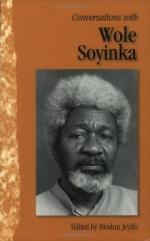|
This section contains 9,590 words (approx. 32 pages at 300 words per page) |

|
SOURCE: Adu-Gyamfi, Yaw. “Orality in Writing: Its Cultural and Political Significance in Wole Soyinka's Ogun Abibiman.” Research in African Literatures 33, no. 3 (fall 2002): 104-24.
In the following essay, Adu-Gyamfi evaluates Soyinka's use of African oral traditions in Ogun Abibiman, noting that the collection's vocabulary “reflects a highly conscious sense of African oral poetics.”
In “New Trends in Modern African Poetry,” Tanure Ojaide observes that “poetry in African is […] currently enjoying an unprecedented creative outburst and popularity” (4). This popularity, according to him, seems to arise from “some aesthetic strength hitherto unrealized in written African poetry which has successfully adapted oral poetry technique into the written form” (4). Though written in English, the poetry carries the African sensibility, culture, and worldview, as well as the rhythms, structures, and techniques of oral tradition, resulting in what Wole Soyinka calls “double writing,” or interweaving of various ethnic, geographic, personal, and peculiar African oral features...
|
This section contains 9,590 words (approx. 32 pages at 300 words per page) |

|


